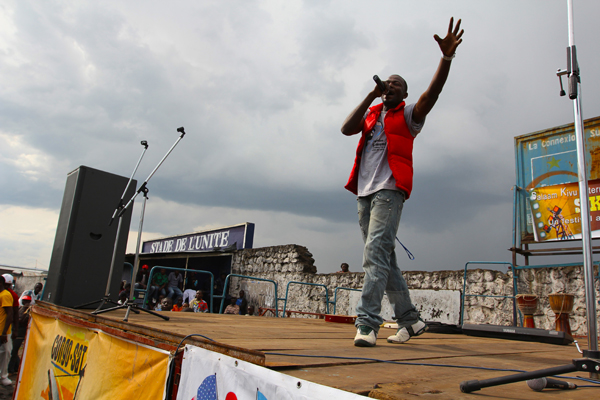
GOMA, Democratic Republic of Congo — The stories we heard at Synergie, a hospital and counseling center for victims of sexual violence, ran over and over again in my mind throughout the night, keeping me awake. Nevertheless, I woke up with an energy I hadn’t yet felt on our jetlagged journey thus far.
Fidel Bafilemba, Enough's Congolese field researcher based here in Goma, picked us up mid-morning, and we took off to navigate the chaotic, pot-holed streets for a meeting with GATT-RN, a civil society coalition working to legitimize and support the trade of clean minerals coming from Congo. Our Enough team was energized to be in the same room with this inspiring group we’re working with to reverse the curse that the country's vast mineral wealth has brought throughout its history and to bring about clean supply chains for Congo's minerals that benefit the people instead of the corrupt system that runs it today.
The GATT-RN team has seen first hand and extensively documented the causal relationship between the mining sector and brutal human rights abuses that result from the current system. As they expressed their appreciation for our collective work to help implement the conflict minerals bill in the United States, we confronted the realization that the bureaucratic hurdles we in the United States are facing, to ensure the regulations issued by the Securities and Exchange Commission are strong, dramatically pale in comparison to those of Congolese advocates as they stare down on the realities here day to day. The intimidation, threats, and risks these advocates and their families regularly experience due to their work and their unrelenting persistence to change the status quo convinced me that our partnership in this effort will only grow stronger and will remain invaluable to our success.
The afternoon marked the first performance of the 6th annual SKIFF Festival (Salaam Kivu International Film Festival) hosted by Yole Africa. Here in Goma, this type of gathering is a rare event and, as the stage was built before our eyes, I could see that many young people in the quickly growing and curious crowd had never witnessed anything like this before. Against the backdrop of a cloudy sky and a huge active volcano—whose last eruption in 2002 still deeply scars the city's landscape—our team found Petna, founder of Yole and one of the chief organizers of the event for his organization. The deep bass of hip-hop music filled the air as children from the surrounding neighborhoods scaled the crumbling walls of the abandoned soccer stadium that served as the site for this event in anticipation of what was to come.
Petna took to the stage to welcome everyone. By the time the first act took the stage, the crowd had swelled to over 1,000.
Who are the rapists? Police.
Where are the schools, roads, and jobs that we have been promised?
What has there been but corruption from our politicians?
These lyrics rang out in Kiswahili and the crowd immediately began to see that SKIFF was as much a protest as it was a concert. Each artist—through music, dance, or film—had one primary goal with his or her participation: to proudly and publicly display a bold freedom of expression that is rarely allowed to exist in such an organized way in this country. When the organizers were refused a permit to hold the huge event they went ahead anyway; the oppressive administrative veil was lifted before the city's eyes. Likewise, the hardened demeanor typical of the city’s residents brightened—laughing and dancing broke out as pent up frustrations were expressed.
Fidel's reaction said it all as he smiled back at us, translating the lyrics as they came, and shouting with joy at the fact that the injustices that are usually so taboo were being freely and openly spoken out in a public space. "THIS is what we need in this country!" he yelled over the music.
These images and fresh memories are what fill my head tonight as I type this post before turning in with a much more positive outlook, knowing that young people are mobilizing and speaking out about the inequalities and injustices they see in their communities and country. Contrary to the doom and gloom that so often is used to define this region, we're seeing the beginning of an inspiring movement.
Photo: A performer at the SKIFF Festival (Enough/Jeff Trussell)

